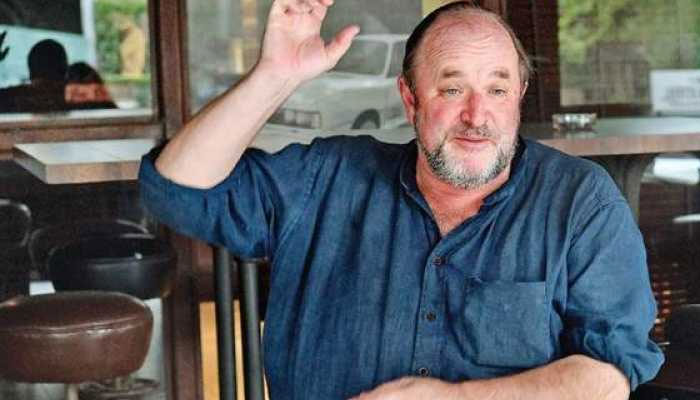Growing popularity of literature festivals linked with South Asia’s rich history of performing arts: William Dalrymple
Internationally acclaimed historian and author William Dalrymple attempted to explain the growing popularity of literature festivals in South Asia, especially in Pakistan and India, as he delivered a keynote address on the inaugural day of the Karachi Literature Festival’s 11th edition on Friday evening.
“Last year we crossed for the first time half a million people at the Jaipur Literature Festival (JLF),” said Dalrymple, who guessed that the KLF organisers invited him to attend the three-day event because of his involvement in the JLF.
“It didn’t obviously start off like that,” he said while talking about the JLF which he described as the largest literary show in the world.
“I remember very well in 2004 the very first session when 16 people turned up, of whom 10 were Japanese tourists who got lost [and ended up in the session],” the author said, bursting into laughter.
Discussing reasons behind the popularity of literature festivals in the region, he said impressive crowds were being attracted to literature shows and one of the key aspects was the region’s long and celebrated history of performing arts.
At a time when people are expressing concerns over a decline in reading and a sharp rise in the consumption of social media content, he said, literature festivals are serving as platforms where literature is performed and subsequently they create a win-win situation for everybody.
“People get a chance to meet with authors, writers get an opportunity to display their books, and publishers find a way to sell those books at literature shows,” the historian summed up.
Dalrymple said he saw a huge gathering at the shrine of Sufi poet Shah Abdul Latif Bhittai, which was a testament to the enthusiasm of the devotees for music and poetry. Before coming to the KLF session this morning, the author said, he paid a visit to the Jamia Masjid of Thatta which he found “more beautiful than those [mosques] in Dehli, Agra or Kabul”.
The author recalled his first visit to Karachi in the early 90s when he met writers Ahmed Ali and Shan-ul-Haq Haqqee, who walked him through parts of Karachi, particularly the Burnes Road area, which gave him an idea about the cultural connection between Delhi and Karachi.
Tracing the history of the art of storytelling and mushairas in the subcontinent, he said one prominent place where these arts were performed was the steps of the Jamia Masjid Dehli.
He said people of the subcontinent were historically fond of performing arts, including daastaangoi, mushaairas and qawwali. He said the tradition became more enriched with great poets like Mirza Galib and Ibrahim Zauq participating in competitions of mushairas, which attracted onlookers to rulers.
Another keynote speaker in the session was noted writer Zahida Hina, who delved into the global history of freedom of expression and talked about those who were either killed or subjected to torture for their efforts to promote free speech.
After exploring the past of Iran, the United Kingdom and Europe in this regard, the author discussed the situation of freedom of speech in Pakistan. She said the situation was deteriorating with every day passing as the government was even making plans to suppress it on internet. She said neither dictators nor democratic leaders in Pakistan wanted citizens to have the right to express freely.
Before the two keynote speeches, several book awards instituted by the KLF were also announced. The Urdu literature prize went to Hasan Manzar for his book ‘Ae Falak-e-Na Insaf’. Mohammed Hanif won the fiction prize for his book ‘Red Birds’, and Tariq Rahman was declared the winner of the non-fiction prize for his book ‘Interpretation of Jihad in South Asia’.
-
 Hilary Duff Opens Up About Marriage Fears Despite Strong Bond With Matthew Koma
Hilary Duff Opens Up About Marriage Fears Despite Strong Bond With Matthew Koma -
 ‘Grey’s Anatomy’ Star Eric Dane Breathes His Last At 53
‘Grey’s Anatomy’ Star Eric Dane Breathes His Last At 53 -
 Donald Trump Breaks Silence On Andrew’s Arrest: ‘It’s A Shame’
Donald Trump Breaks Silence On Andrew’s Arrest: ‘It’s A Shame’ -
 DJ Khaled Shares Weight Loss Progress
DJ Khaled Shares Weight Loss Progress -
 Jennifer Aniston And Jim Curtis Share How They Handle Relationship Conflicts
Jennifer Aniston And Jim Curtis Share How They Handle Relationship Conflicts -
 Shamed Andrew Real Birthday Plans As Cops Showed Up At Door
Shamed Andrew Real Birthday Plans As Cops Showed Up At Door -
 Pete Davidson’s Girlfriend Elsie Hewitt Says 'everything Hurts' After Sudden Medical Emergency
Pete Davidson’s Girlfriend Elsie Hewitt Says 'everything Hurts' After Sudden Medical Emergency -
 Princess Beatrice 17 Holidays Per Year Exposed Amid Andrew Arrest
Princess Beatrice 17 Holidays Per Year Exposed Amid Andrew Arrest -
 Who Is 'Queen Of Woke'? UK First Female Civil Head
Who Is 'Queen Of Woke'? UK First Female Civil Head -
 Dwayne Johnson Confesses What Secretly Scares Him More Than Fame
Dwayne Johnson Confesses What Secretly Scares Him More Than Fame -
 Elizabeth Hurley's Son Damian Breaks Silence On Mom’s Romance With Billy Ray Cyrus
Elizabeth Hurley's Son Damian Breaks Silence On Mom’s Romance With Billy Ray Cyrus -
 Shamed Andrew Should Be Happy ‘he Is Only In For Sharing Information’
Shamed Andrew Should Be Happy ‘he Is Only In For Sharing Information’ -
 Daniel Radcliffe Wants Son To See Him As Just Dad, Not Harry Potter
Daniel Radcliffe Wants Son To See Him As Just Dad, Not Harry Potter -
 Apple Sued Over 'child Sexual Abuse' Material Stored Or Shared On ICloud
Apple Sued Over 'child Sexual Abuse' Material Stored Or Shared On ICloud -
 Nancy Guthrie Kidnapped With 'blessings' Of Drug Cartels
Nancy Guthrie Kidnapped With 'blessings' Of Drug Cartels -
 Hailey Bieber Reveals Justin Bieber's Hit Song Baby Jack Is Already Singing
Hailey Bieber Reveals Justin Bieber's Hit Song Baby Jack Is Already Singing




